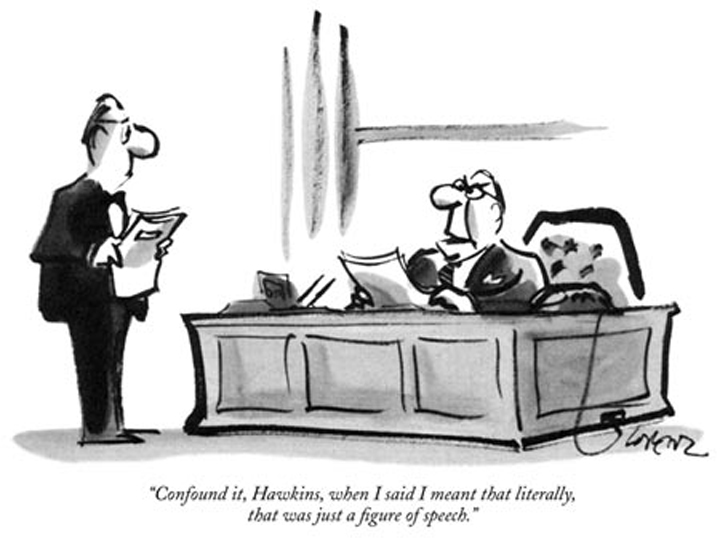 We've all heard the question of whether or not the Bible should be taken "literally." The answer seems to be "yes" if you are (a) a fundamentalist who believes everything the Bible says no matter what reality it clashes with or (b) an atheist.
We've all heard the question of whether or not the Bible should be taken "literally." The answer seems to be "yes" if you are (a) a fundamentalist who believes everything the Bible says no matter what reality it clashes with or (b) an atheist.The group that wants to say "no" or "not always" are the more moderate believers of the Bible (or liberal believers or mainstream believers or whatever label you prefer), those who recognize that the Bible often says things that do not jive with reality and therefore must be metaphorical in nature. In fact, some of these moderate believers -- because fundamentalist and atheists both tend to read the Bible literally -- declare that atheists are "no better than" fundamentalists for failing to understand the nuances of this special book.
What fundamentalists and atheists have in common is the attempt to honestly face the reality of their world, but the reality of an atheist is the actual world, while the reality of a fundamentalist is what is written in an old book.
So atheists can recognize that the universe is billions of years old, for example: a fact that is proven in the real world with overwhelming evidence. Atheists can then read the literal words of the Bible -- which says that the earth and everything on it was created by a god in six days -- and know that this book is an artifact from a pre-scientific age when then-unanswerable questions were addressed with supernatural stories--which no one faults the ancient writers for writing.
Fundamentalists read in the Bible that the earth was created in six days and believe it, on "faith." When confronted with the fact that this simply isn't true by people who observe the real world, fundamentalists defer to their "reality" (the Bible) and deny that the actual reality exists.
You can, I hope, see the difference between these two camps.
Atheists also have something in common with moderate believers, which is that both have to continually change their perception of reality according to new information provided about the universe. But the difference here is that the atheist (again) only has to deal with actual reality. A moderate believer in the Bible has to deal with actual reality and the reality of this very outdated book. So moderates have elements of both the fundamentalist and the atheist.
So when new evidence about the universe comes along, the atheist can just be happy about it, discard the outdated view, and have a better picture of reality. For the moderate, the new evidence can't be denied either, so it has to be force-shoved backward into the holy book--with the pretense of seamlessness, as if it were there all along, often by imagining that clear, plain, and "literal" language is metaphorical when (as is obvious to any good reader) it simply isn't.
So, presented with new information about the age of the universe, the moderate believer has to now say that the word "day" in the six day creation story was being used figuratively. "Of course it wasn't meant as a literal day," they say, but the "of course" is only obvious in retrospect. Before evidence to the contrary appeared, the literal meaning of the word "day" worked just fine and would have never been taken figuratively.
So you'll hear that a "day," to God, can be thousands or millions or billions of years... or that the creation story was written as a simple myth since the Bible didn't want to concern itself with hard science... or whatever explanation you like, as long as the Bible isn't discarded entirely. You'll also hear, as another example, that it's true that the universe was created with the Big Bang, but now it was God who set it off. He also used evolution to get us here, etc. etc. People living in the real world do all the difficult work explaining the nature of the universe, and the moderate believer can come along at the end of it and say "That, too, was in our book all along."
So I hope you can see the difference in those two camps as well. From what I've heard, atheists often prefer (if that's not too strong a word) fundamentalists to moderates because at least fundamentalists attempt to read words that are on the page (if those pages are in the Bible, that is), stick with their "reality," and (perhaps most importantly) unintentionally expose the outdated beliefs in the book for what they really are. Moderate believers in the Bible, on the other hand, are slippery experts of retro-fitting and help to perpetuate something that should have expired shortly after the Enlightenment.
So let's look at some specific, textual examples to talk about literal and figurative language -- as well as genre -- from the Bible and from another source that was being written at around the same time as some of the Hebrew scriptures, Aesop's fables.
First, let's look at the opening of Genesis 3:
Now the serpent was more crafty than any other wild animal that the LORD God had made. He said to the woman, "Did God say, 'You shall not eat from any tree in the garden?' " The woman said to the serpent, "We may eat of the fruit of the trees in the garden; but God said, 'You shall not eat of the fruit of the tree that is in the middle of the garden, nor shall you touch it, or you shall die.' " But the serpent said to the woman, "You will not die; for God knows that when you eat of it your eyes will be opened, and you will be like God, knowing good and evil." So when the woman saw that the tree was good for food, and that it was a delight to the eyes, and that the tree was to be desired to make one wise, she took of its fruit and ate; and she also gave some to her husband, who was with her, and he ate. Then the eyes of both were opened, and they knew that they were naked; and they sewed fig leaves together and made loincloths for themselves.
Now let's look at the entirety of the fable "The Bee and Jupiter" from Aesop:
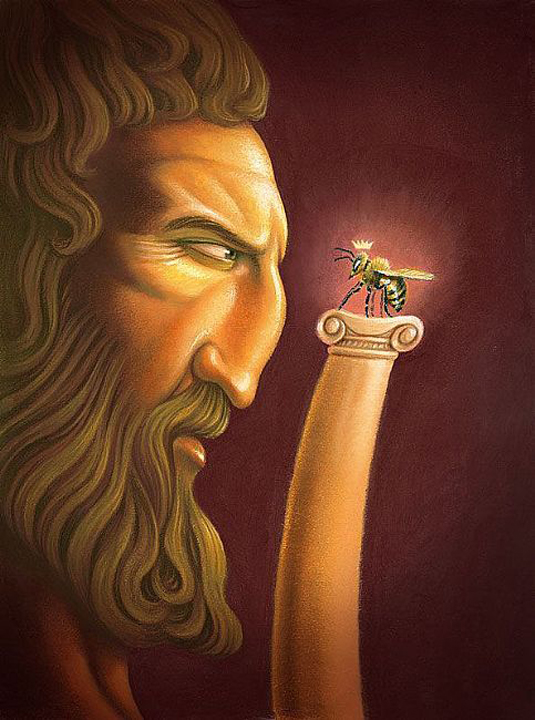 A bee from Mount Hymettus, the queen of the hive, ascended to Olympus to present Jupiter some honey fresh from her combs. Jupiter, delighted with the offering of honey, promised to give whatever she should ask. She therefore besought him, saying, "Give me, I pray thee, a sting, that if any mortal shall approach to take my honey, I may kill him." Jupiter was much displeased, for he loved the race of man, but could not refuse the request because of his promise. He thus answered the Bee: "You shall have your request, but it will be at the peril of your own life. For if you use your sting, it shall remain in the wound you make, and then you will die from the loss of it." Moral: Evil wishes, like chickens, come home to roost.
A bee from Mount Hymettus, the queen of the hive, ascended to Olympus to present Jupiter some honey fresh from her combs. Jupiter, delighted with the offering of honey, promised to give whatever she should ask. She therefore besought him, saying, "Give me, I pray thee, a sting, that if any mortal shall approach to take my honey, I may kill him." Jupiter was much displeased, for he loved the race of man, but could not refuse the request because of his promise. He thus answered the Bee: "You shall have your request, but it will be at the peril of your own life. For if you use your sting, it shall remain in the wound you make, and then you will die from the loss of it." Moral: Evil wishes, like chickens, come home to roost.You can see that these two examples have lots in common: a god (Yahweh and Jupiter, both of whom were believed to be real by their followers), a talking animal, an explanation of why things are the way they are (later in the Genesis story, it is even explained why a snake crawls on its belly), and more.
However, no one believes the Aesop story to be factual. No one thinks that bees have stingers because Jupiter did it or that bees were ever able to talk. Of course, almost no one believes in Jupiter (who the Greeks called Zeus) anymore, and of course not everyone knows this story (unlike the Genesis story, which everyone knows), but even Jupiter-believers of Aesop's day wouldn't have believed this story to be factual. They would have recognized it as a fable, which is a simple story -- usually involving animals -- that illustrates a moral.
So why is Genesis believed if Aesop isn't? One reason, of course, is because people do still believe in the Jewish god Yahweh who also became the god of Christianity and Islam (so powerful he's now just known as "God"). The reason why people still believe in Yahweh and not Jupiter is another story entirely, but the quick answer is that Yahweh -- unlike the more accepting gods of neighboring religions -- is an all-or-nothing jealous god whose followers kill or oppress to keep him number one. This kind of enforcement, naturally, leads to people taking God's holy book a little more seriously than they do Aesop's fables.
Because, yes, it is a fable, and fables are never to be believed, just used. So genre is the main reason no one believes Aesop. So what genre is Genesis? Is it, too, a fable? A parable? A myth? A history? A science lesson? My vote is on myth, but with a qualifier that I'll explain soon.
The Adam and Eve story is not direct enough for a parable, since there's no clear moral. What would the moral be? "Knowledge, even if it's forbidden, helps you to know the difference between good and evil"? If so, why is this a bad thing that gets Adam and Eve kicked out of the Garden of Eden? And what about all this stuff about death? God says they'll die, but the serpent says they won't. And they don't! Too complicated, weird, and unexplained for a fable, the moral of which can be (and usually is) summed up in once sentence.
But it's got elements you expect from myth: a god, supernatural animals, "firsts" (man, woman, snakes, disobedience, etc.), magic food and trees, questions about the nature of death, knowledge, civilization, humanity, etc. Myths aren't necessarily meant to be "believed," but they are meant -- though symbols and archetypes -- to express large truths and feelings that are difficult to get to in a nonfictional way. Myth is like a dream: even if you can't explain the meaning of it to yourself when you awake in the morning, it doesn't matter because it has already done the psychological work, and you are changed. So people could and did believe in a literal Jupiter, but they also could recognize him as a symbolic signifier.
So here's my qualifier about Genesis as myth. The book feels like it was once a more clear myth that got jumbled up with other myths and stories and histories and everything else. In fact, the first chapter of Genesis is the six-day creation story while the second chapter is this snake story, and they're both related but very different accounts of the creation of mankind... and with two different sets of gods: Yahweh (the snake story) and the Elohim (at least two gods of the six-day story). This gets jumbled with two different versions of the Noah story (two animals vs. seven animals and other inconsistencies) and the Tower of Babel story and other myth-like stories, while those eventually get jumbled with the more "historical" (though not actual history, of course) accounts of Abraham and his descendants, which merge myth and legend.
So everything is a complete mess. This complete mess -- for the Torah -- even has a name, which is the Documentary Hypothesis, which looks like this:
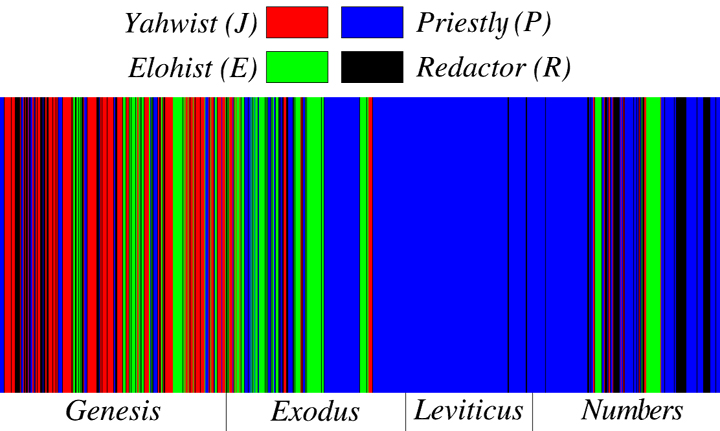
The Documentary Hypothesis says that at least four different documents make up the first four books of the Bible and that these documents were blended together (somewhere along the way) to give us what we have today. It would be like if you took the four gospels (Matthew, Mark, Luke, and John) -- which are also varied, contradictory, and contain difference voices -- and blended them together into some kind of rough chronology (which does happen in people's heads, if not on the page).
So in mixing documents, we're also mixing genres. In mixing genres, it's impossible to tell what the intent of the writers were who gave us the books, which makes it impossible to tell whether we're to take anything "literally" or not. And this is all after the possible oral stories and rituals that got them there to begin with. So the source materials of Genesis were probably great myths, but now they are near-useless nonsense.
One thing we can do is to raise this question for believers of every stripe: why would God allow this mess to happen? Why doesn't he present his message to humanity more clearly? Why does he begin with a jumble of contradictory myths (which is rather like trying to describe four separate dreams at once to a listener who would be confused to hear even one) only to eventually give us (in the rest of the Bible) legends and histories and confusing prophecies and songs and proverbs and even erotica? If the answer is that man screwed it up, that doesn't help much, since the man-screwed version is all we have. It's all we have, and yet -- in spite of its obvious errors -- it is still so widely regarded and considered "inspired."
The usual answer to these sorts of questions is not that man or God or anyone screwed anything up but that everything is as it should be. It just has to be properly understood with "spiritual" discernment. The usual answer quotes Jesus when he says, "I thank you, Father, Lord of heaven and earth, because you have hidden these things from the wise and the intelligent and have revealed them to infants..." The answer is that the Bible is a literary puzzle to be solved, but it can't be solved by adults using their minds: you have to "become like children," turn off your brain, and tap into the spirit of God for the truth.
In other words, my trying to make sense out of all this is counterproductive because I'm thinking like a man, not like God. God does everything mysteriously. You have to wait for his invisible ink to appear and then hold the backward letters in the mirror and then convert those letters into numbers and know what the numbers symbolize, and if you kill a goat in the moonlight at midnight, the stone door will open and you can walk inside the crystal palace.
To that line of (very common) thinking, I'd like to say this: Nonsense. It's just another book.
So, just like any other book, it can be read by human beings, no problem.
In fact, I doubt the earliest readers of these Biblical stories (or hearers of these stories before they were written down) looked for any mysterious meaning. When ancient believers were told that God appeared in the form of a burning bush, they accepted it as easily as you accepted it when your parents told you that Santa Claus went down your chimney at Christmas to give you that new bike. Why would God's followers, who had no other answers, have any reason to doubt him? It was only when doubt crept in -- through our greater understanding of the universe -- that we began to retro-fit God's books as metaphorical.
 When children first begin to doubt the existence of Santa Claus, many parents do not initially give in and simply reveal him as false. Instead, they invent some additional explanations to satisfy the child for a little longer, to keep the "magic" going.
When children first begin to doubt the existence of Santa Claus, many parents do not initially give in and simply reveal him as false. Instead, they invent some additional explanations to satisfy the child for a little longer, to keep the "magic" going.So the initial myth is that Santa Claus travels around the entire planet in one night, on a sleigh pulled by reindeer, visiting each individual house to leave presents, taking the time to eat cookies and drink milk. But what happens when the child says, "How does Santa have time to make it to every house in one night?" The first answer might be something like "He's very fast," which satisfies for a while. (One imagines that his reindeer once walked on the ground and then had to evolve into fliers in order to answer these sorts of questions.) A more complicated answer might be needed later, as the child becomes more educated: "Santa Claus travels so fast that he approaches the speed of light and affects time, so that what seems like one night to us is actually thousands or millions of nights to him."
You see the parallels. As the child becomes older and more sophisticated, more sophisticated answers have to be given about Santa. As humanity becomes older and more sophisticated, more sophisticated answers have to be given about God. Eventually, of course, either the parents cracks and says "Santa Claus isn't real" or the distance between real life and fantasy becomes so great for the child that he or she grows out of it, no matter what the parents say. In the case of telling God stories, the "parents" will never crack, either because they are (usually) believers themselves or because they have something to gain from perpetuating the factualness of the story. So it is up to the "children" to simply stop believing.
Once you clear away all the apologetics about the Bible, you can read it for what it is. Once you realize it isn't a magic, secret book, you can read it for what it is. Once you do your best to clear away everything your parents and grandparents and pastors and youth leaders and television programs and politicians and everyone has said about it, you can read it for what it is.
You can read it literally!
Naturally, there are things that are figurative within the literal. For example, in the excerpt about the serpent above, there is a sentence where the snake says "... when you eat of [the tree], your eyes will be opened." This is figurative language. It doesn't mean that when Eve eats the fruit that her eyelids will be pried open after walking around with them sealed the entire time. No one thinks this, because everyone is able to recognize figures of speech. "Your eyes will be opened" means that something will be revealed: in this case, the knowledge of good and evil. Even fundamentalists don't take these kinds of things "literally."
There are also fuzzy areas. For example, Jesus says many things that could be taken either way, like when he says it's good to tear out your right eye if it causes you to sin. Does he mean it literally, that if you lust after a woman who isn't your wife (since this is what he was talking about at the time), you should cut your eye out? He might, and he's said crazier things than that. But it doesn't really make much sense. The right eye only? Don't you look, and lust, with both eyes? And how would this stop the sin really? Most would assume that Jesus was being figurative in this case, telling you to get rid of whatever causes you to sin. Jesus, like some of the prophets, are a special case, since they seem to present themselves as "spiritual" speakers, meaning that they almost always speak metaphorically. Still, it's difficult to tell, and I wouldn't be surprised if he really wanted you to throw your eyeball in the garbage can.
So what I'm talking about are places where there is no reason (other than reality) to doubt that the writing is literal, where it takes considerable effort to come up with what the writer is "really" saying. In the "your eyes will be opened" example, our brain automatically treats the phrase as figurative. In the Jesus example, we're not quite sure. But in the case of the six day creation story, we have to do a lot of difficult work in order to force it to be figurative.
Since comparing a myth to a fable has problems, let's try comparing a myth to a myth. In fact, let's try comparing the near-identical myths: the Noah story and the Utnapishtim story from the Epic of Gilgamesh, which pre-dates the Bible by about a thousand years.
In the Biblical Noah story, mankind becomes too wicked and God regrets creating them, so he decides to destroy them with a flood. But God chooses to save Noah, his family, and a sampling of animals on an ark that God has Noah build. The boat lands on Mt. Ararat and Noah sends a raven and two doves to look for dry land. When the family leaves the ark, they sacrifice animals to God who says it was a mistake to destroy mankind and puts a rainbow in the sky as a sign that he'll never do it again.
In the story of Utnapishtim, the gods -- headed by Enlil -- want to destroy mankind with a flood because they are too noisy. But Ea, in a dream, warns Utnapishtim, who builds a boat and saves his family, the workers who helped build the boat, and a sampling of animals. The boat lands on Mt. Nimush and Utnapishtim sends a raven, a swallow, and a dove to look for dry land. When the humans leave the boat, they sacrifice animals to the gods. A goddess puts her necklace in the sky (a rainbow) as a sign that she will never forget these events, and Enlil is scolded by her and the other gods for bringing the flood.
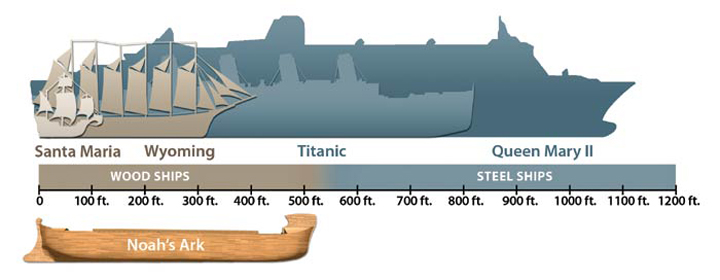
Atheists, of course, have no trouble dismissing both of these stories as equally impossible. We can enjoy them as literary works that offer up some commentary about the desire for immortality and the nature of survival against the brutality of nature, and we can recognize and appreciate that the Biblical story was a borrowing from the older culture who composed the Gilgamesh epic.
What do fundamentalists do with the brutal fact of the Utnapishtim story? I'll let one of them (Frank Lorey, M.A., writing for the Institute for Creation Research) tell you in his own words (words in bold mine):
Dating of the oldest fragments of the Gilgamesh account originally indicated that it was older than the assumed dating of Genesis. However, the probability exists that the Biblical account had been preserved either as an oral tradition, or in written form handed down from Noah, through the patriarchs and eventually to Moses, thereby making it actually older than the Sumerian accounts which were restatements (with alterations) to the original.
The divine inspiration of the Bible would demand that the Genesis account is the correct version. Indeed the Hebrews were known for handing down their records and tradition. The Book of Genesis is viewed for the most part as an historical work, even by many liberal scholars, while the Epic of Gilgamesh is viewed as mythological. The One-source Theory must, therefore, lead back to the historical event of the Flood and Noah's Ark. To those who believe in the inspiration and infallibility of the Bible, it should not be a surprise that God would preserve the true account of the Flood in the traditions of His people. The Genesis account was kept pure and accurate throughout the centuries by the providence of God until it was finally compiled, edited, and written down by Moses. The Epic of Gilgamesh, then, contains the corrupted account as preserved and embellished by peoples who did not follow the God of the Hebrews.
So this sort of fundamentalism rejects that the Utnapishtim story is a thousand or so years older, in spite of the evidence, because "the probability exists" that it isn't. The word probability should be replaced with the words extremely slim possibility. The unalterable belief that the Bible is divinely inspired "demands" that Genesis is correct and that God "preserved" it with his people and not the others. This is what we in the fallacy business call "begging the question." The Bible as a "historical work" is incorrect, and that it is viewed as such by "some liberal scholars" may be true if "some" means three or four among thousands and thousands. (Compare with the "some scientists disagree with man-made global warming" argument.) The insulting conclusion of this argument is: "No, they borrowed from us!"
In other words, the usual willful ignorance and "la la la, I can't hear you" response you would expect from a fundamentalist, who is both dismissive and offensive toward a belief that isn't his own.
So what about moderates? Moderate believers have to admit the impossibility of these flood stories, and they also have to recognize that the Utnapishtim story is considerably older than theirs. This was an especially embarrassing fact to admit in the history of the moderates because the Epic of Gilgamesh wasn't discovered until 1853. This meant that once they finally were forced to admit that a worldwide flood didn't happen, all those animals couldn't fit on a boat, etc., insult was added to injury when they had to further admit that their story was plagiarized from a "pagan" source, from a people who were enemies of their god!
After the initial sting wears off, the moderate recovers as swiftly as always, declaring that "of course" the Noah story didn't actually happen, but that the world flood story is such a beloved myth that the Bible needed it too, and that it provides an important message about starting over when things get too bad, or whatever, etc. etc.
Well, if that is the case and it's all just metaphor, then might I offer this proposal, at least for this flood story: follow the Epic of Gilgamesh instead! Use it as your holy text. It's more ancient, more pure, and (where it varies) it's a much better story! Here's why:
Weather, like a flood, does not destroy because humanity is wicked. Weather is not a judge of morality. But it may destroy if mankind becomes too "noisy." We, right now, have become too noisy, too populous, and we are altering the weather with the things we do to the environment. The ice caps are melting, and soon parts of Florida may be underwater. If the gods are metaphors for weather disasters, the Utnapishtim story makes more sense.
In the Noah story, God talks to Noah with an audible voice, which is something that doesn't really happen. But people do have dreams, which Utnapishtim has. This is all metaphor, remember? The moderates have agreed on that. So a man having a dream to do something about the impending weather conditions is realistic and fits the metaphor perfectly.
Noah allows everyone but his family to die, but at least Utnapishtim has the decency to save the workers who helped with the boat--who he would have obviously needed to complete such a massive undertaking. More realistic and more moral.
Three different birds (raven, swallow, dove) obviously make for better story-telling than two birds with one repeated (raven, dove, dove) and has more potential symbolic meaning.
Most important, the gods of the Utnapishtim story can represent various aspects of nature or even of human nature, so it would make sense that they quarrel over who did the correct thing where the flood was concerned, and it gives us a greater metaphorical story. What doesn't make sense is a God who creates mankind, regrets it, kills them all with a flood, then regrets that. What sort of god is that? I'll tell you what kind: it's the kind that is attempting to be all the gods at once. Since the Noah story was plagiarized, the quarrelling gods couldn't happen. Instead, God had to have a multiple personality disorder and argue with himself.
And what moral lesson is finally learned after the flood is over? We learn in both that gods enjoy cooked animals, but in the Gilgamesh story, Utnapishtim is able to relate this story to Gilgamesh as part of an attempt to persuade him that he will not be given immortality, so that the lesson is that humanity should face our death with dignity and with a desire to leave something positive behind, which Gilgamesh eventually does. In the Genesis story, however, what happens afterward is that Noah gets drunk and his son rapes either Noah's wife or perhaps Noah himself. (The text is ambiguous, but something incestuous happens.)
Which story, if neither is historical and merely meant as moral metaphor, would you prefer? Why would the moderate believer pick Noah over Utnapishtim? Why wouldn't you worship Ea over Yahweh? The answer can almost only be that the moderate was simply raised to know and prefer God/Yahweh no matter what, even if all of his tales are metaphorical.
And if all of his tales are metaphorical, if all of these are just made up stories, then how does anyone know anything about God at all? For someone reading the Bible literally, we can learn plenty about God, but if these stories are rejected as figurative, we know nothing of him.
I hear the answer now: "God is mysterious, and our puny, mortal brain can't understand it." If that is so, then how is the moderate's puny, mortal brain able to understand that he is mysterious? What secret decoder ring have they used to know even this one thing about God, which is that they cannot know nothing about him? It's as if they're saying, "We can never know the mind of God. Now, here's exactly what he thinks..."
The best argument, perhaps, is that the Bible is full of metaphorical words that are meant to create an impression of what God is like, since apparently the book can't manage to do it more directly. But, guess what: the impression those metaphors and images give is that God is a tyrannical, jealous, petty, quick-tempered, unimaginative, murderous, racist, misogynistic psychopath who wants us to be just like him (as long as we grovel in the process). Read the Bible literally or read it metaphorically: God is an asshole, a figurative asshole.
Let's take an example of how something that was written as literal was transformed over time into the figurative and then into something metaphysical: heaven.
When I first read the Bible at age six or so, I wasn't able to look at it with my own eyes -- like I would have for any other new book -- but from someone else's point of view: from thousands of years of theology filtered through church, parents, pop culture, etc.
So in the first sentence -- "In the beginning God created the heaven and the earth" -- I thought the "heaven" being referred to was "Heaven," the dwelling place of God, the place we go when we die, the realm that exists somehow out of our universe, the place depicted in countless films and comic strips. Because my reading had been adulterated, I wasn't able to read the literalness of the words, which might normally be read as "In the beginning, God created the sky and the ground."
I was further corrupted from a pure reading because I was already told who "God" was. This wasn't like reading The Catcher in the Rye for the first time, where the name "Holden Caulfield" had no prior attachments for me. "God" was a word with pre-packaged meaning, handed to me from birth until this point.
And in addition to misreading the word "heaven," I also misread the word "earth," because I thought I was reading about the earth that I already knew really well just from living in the 20th century: a sphere spinning and orbiting the sun, residing within the solar system and the milky way--with its single moon that we had actually landed on six years before I was born.
But this wasn't the "earth" the writers of Genesis were describing. They were describing a flat earth floating on the sea (elsewhere in the Bible described as having four literal corners), with an underground (call Sheol or Hell) at the bottom and a dome covering the top, holding back the chaotic waters that God would eventually (in the days of Noah) let loose through the dome's windows. The earth was "fixed" by God (later described as being held by pillars) in the middle of everything. The lights -- sun, stars, and moon (a moon that gave its own "lesser" light) -- were attached to the dome.
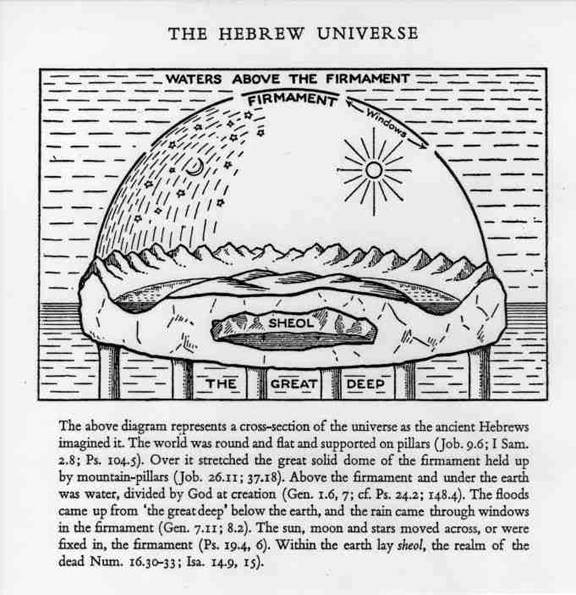
Because I was picturing the correct, modern conception of earth, I had to read the first chapter of Genesis a thousand times to figure out what was being described. "Let there be a firmament in the midst of the waters, and let it divide the waters from the waters"? What? (It didn't help that I was reading the beautiful but archaic King James Version of 1611, which was all that was allowed in my church.)
So my reading was corrupted by fundamentalism but also by modern science, since I was able to learn and believe both, being raised in a church and family that had both moderate and fundamentalist leanings. There was no way I was going to be able to properly read this book. I kept asking myself "Where are the Neanderthals?" and "Where are the dinosaurs?" and "Where is the Big Bang?"
I was skilled at living with cognitive dissonance even at this age, but it could only get me so far. It was only when I was older that I was able to adopt the "sophisticated" explanations for why the Bible was so horribly wrong. When I read "as a little child," the emperor had no clothes, but I learned to see them soon enough, and it was decades before he was naked again.
So, in the beginning, heaven was just heaven, was just sky. And apparently God lived either in the sky or above the sky, above the dome. It would have been pretty easy to believe originally, since no one was able to go up there and check it out, just as no one was able -- originally -- to see if there were any gods on Mount Olympus. In the Tower of Babel story, the tower was destroyed because God thought we might actually be able to reach the top and find him. Clearly, gods don't like to be found. (I used to have a joke about how Neil Armstrong landed on the moon and saw Jesus sitting there in a lawn chair, saying, "Aw, crap, you found me.")
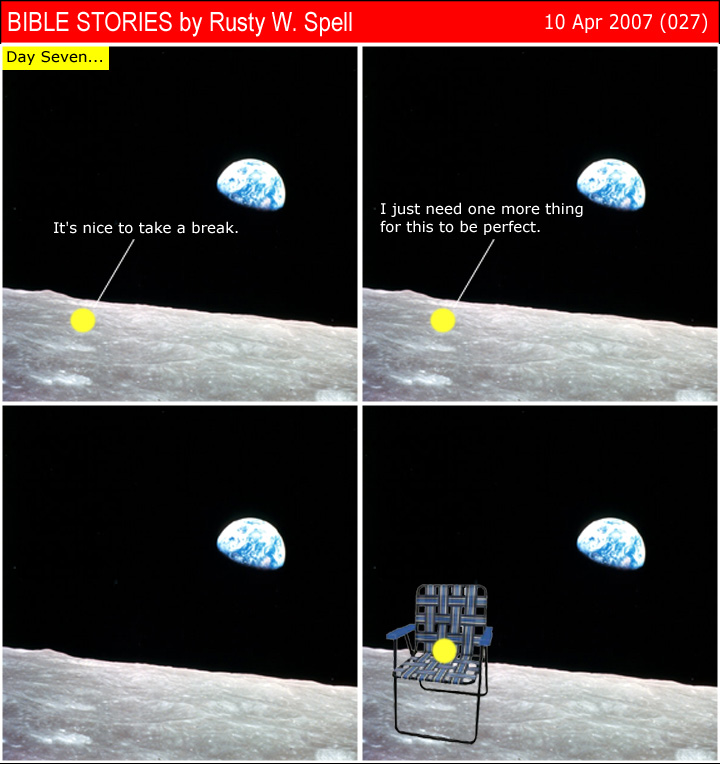
Much later, Jesus confused things further when he was able to say (in the Lord's Prayer) "Our father in heaven," but also that we should seek the "Kingdom of Heaven." It's difficult to tell what Jesus meant by those kinds of phrases (difficult Jesus again), especially since different writers had him expressing different things. Sometimes Jesus seemed to be speaking of the actual sky, "Our father in the sky." Other times, he seemed to be talking about the "inner life" (another metaphor): the Kingdom of Heaven, not as a physical place, but a state of mind. Of course, he could still keep it literal if he wanted to, since God was still safely out of sight.
As a result of Jesus's confusing talk and apocalyptic works like the Revelation, "heaven" got turned into "Heaven," and the place where God lived (the sky) became the place where we could live (after death) if we followed Jesus. All dead people going to the underworld (which made a certain kind of sense) became dead people either going to Hell (to burn) or to Heaven.
But then, you know, we went to the moon. Oops. We actually got to see that giant ball we lived on. We knew it wasn't flat for a long time before that, and of course we eventually figured out that we went around the sun and not vice-versa, and we knew that there wasn't a bunch of cosmic water above the sky dome and that there wasn't an underworld and that the universe is expanding and that we're just a dot on its map, etc. etc. We knew these things for hundreds of years, and the moon landing should have been the final nail in the coffin of any Biblical or Biblically-inspired concept of "heaven" and "Heaven" both.
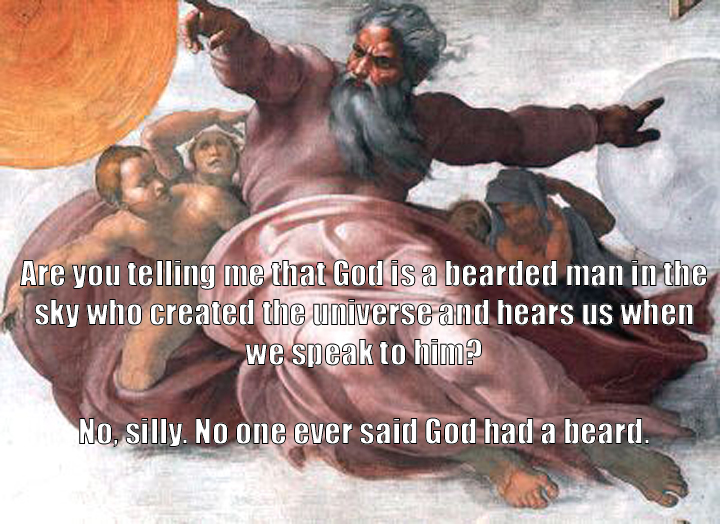 But, instead, for all of those hundreds of years, moderate believers retro-fitted and re-defined. "Oh, you silly, God isn't some man in the sky. We're not going to live with him in the clouds. Heaven is a place that exists beyond the confines of this universe, since God is not of this universe but the creator of it." Universe? I only read that God created the sky and ground. The book doesn't seem to be aware of anything beyond a very small range and certainly has no concept of the solar system or expanding universe.
But, instead, for all of those hundreds of years, moderate believers retro-fitted and re-defined. "Oh, you silly, God isn't some man in the sky. We're not going to live with him in the clouds. Heaven is a place that exists beyond the confines of this universe, since God is not of this universe but the creator of it." Universe? I only read that God created the sky and ground. The book doesn't seem to be aware of anything beyond a very small range and certainly has no concept of the solar system or expanding universe."Oh, well, the book was written for people with a limited scope of knowledge, so God didn't want to confuse them with the real picture of the universe." Why would it have confused them? What would be so difficult about saying that God took billions of years to get things where they were: a moon spinning around the earth, the earth spinning around the sun? Seems less confusing than what's actually written in the Bible, which sounds more like something a two-year-old would imagine before learning science.
"Oh, and Hell isn't really a place underground. It's just the absence of God." That's not what your book says! "Well, you're reading it wrong, honey. Don't take it literally. Don't read what it actually says. Just listen to what I say instead, because my priest explained this all to us already. In fact, don't bother reading the book: that's your trouble."
And what would be so difficult about picking a genre that made sense? There was nothing fancy going on when Abraham's lineage was described, for example, so we know that straightforward writing was possible. Besides, God can do anything! As Carl Sagan once pointed out, God could have put E=MC² in the Bible somewhere if he had wanted to. But, no, the "end times" battles use swords and horses.
By this point in history, there is very little in this most important book in the world (inspired by God himself) that can be taken literally or historically (since Abraham and company didn't exist, the Exodus didn't happen, etc.) if you're going to live in the real world. So is the entire book taken as a metaphor? David and Goliath weren't real but are representations of the large spiritual battles we fight? Jonah and the Big Fish isn't real but simply symbolizes the low points we go through when we run from God? Jesus didn't really turn water into wine but instead this was a story about how we can take a banal life and make it more satisfying?
I'm willing to accept this argument if we can go one step further: God, too, is a metaphor.
Willing as many moderate believers are to declare that almost everything in their book is a metaphor, they are not willing to say that God or Jesus is. Usually they're not willing to say that the resurrection is, or any of the miracles--even though those do have fairly obvious metaphorical and spiritual implications: making the blind see, healing the sick, raising the dead, etc. Heaven isn't a metaphor either, although "heaven" is a metaphor for Heaven.
Hell and Satan could go either way. People are more willing to drop the evil stuff.
This is where the atheist frustration comes in. "Who gets to choose what is metaphorical and what isn't?" is the biggest complaint. It's a valid complaint. Why does this book, this anthology, get so much wiggle room when it comes to what it "really" says and what it doesn't say? No other book in our culture seems to have this superpower.
The answer is usually that it's not just another book, because it's a book inspired by God--you know, according to itself. (The Koran, according to itself, was dictated by God, but no Bible believer seems to care about that.) So the answer for who gets to decide figurative vs. literal goes something like this: "Each believing individual gets to decide for him or herself what the Bible is 'really' saying and can believe whatever he or she wants to believe about it, as long as the belief in God remains. For Christians, this also means Jesus and the resurrection."
And, yes, believing sub-factions will disagree with each other, but they are all unified in the one main premise: God exists, and the Bible is his word, so do whatever you need to make those two things seem true.
So, since God and Jesus are metaphors themselves, we end up with metaphors of metaphors. "The world flood didn't really happen, of course, but it was written to foreshadow the coming of Christ's church, which is the 'vessel' that we all need to get inside in order to be saved." Or a simpler example: "The lamb Moses made his people sacrifice was a metaphor for Jesus."
Because, yes, the other thing that happened during after the New Testament writings was that we learned that, apparently, the Old Testament was all about Jesus. Everything. The Gospel of John kicks it off in grand style by re-writing the creation story so that Jesus is the "Word" that was spoken by God to create light and the rest of it, so that God created Jesus who created everything else.
The Christian theologians who came after the New Testament was complete were the ones who really ran with the idea. Everything the prophets ever said was about Jesus. Abel was a type of Jesus, the first martyr for God. Noah was a type of Jesus, who saved us all from a sinful world. Isaac was a type of Jesus who was (in this case, nearly) sacrificed by his father. Jonah was a type of Jesus who was in a death-like state for three days and came out. The list goes on and on.
You even hear it said for non-Biblical characters in modern times, so that "secular" characters get to be about Jesus, too: Superman is Jesus. Neo from The Matrix is Jesus. Everyone is Jesus!
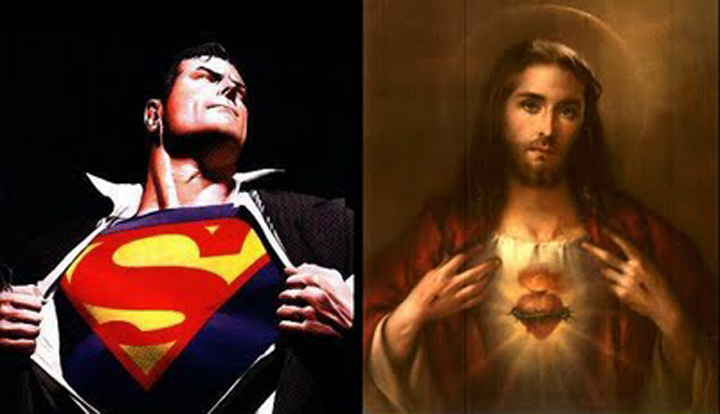
But since Jesus is really a metaphor himself, it would eliminate the middle man to say that all these things are metaphors for the one thing they're all pointing to: a "killing" of the old self to "resurrect" as something new and improved--all of which is metaphorical language, all of which we understand, which means that if we could really understood this and not insist that Jesus and God are the stopping places, we'd finally be getting somewhere.
But we're not getting anywhere. It's just as muddy as it always was, and once you clear away the mud you see that the Bible is trying to say, literally, some basic stuff: God created the world and mankind (as written), he wasn't happy with it so he killed almost everyone in a flood (as written), he picked one guy (Abraham) and his family to pay attention to and give land and power to (as written), a bunch of stuff happened that made God variously happy and sad, etc. (as written). It's just a story, and it can be understood without "reading between the lines."
So I'm afraid I'm no longer able to go down the pot-fueled rabbit hole to arrive at the conclusions moderates would have me believe now that I'm able to read the Bible myself with my own educated working adult brain. I'm not willing to fast for thirty days, take peyote, and then read the book in order to find its psychedelic hidden meanings. I'm not willing to suffer the tedium of list after list of patriarchal lineages and pretend that they have hippie-dippy spiritual significance. I'm not going to read the erotica of the Song of Solomon and take a hit of ecstasy which will allow me to see that it is actually a love letter from God to the Jews or from Jesus to the Bride of Christ.
Call me secular, call me lacking in spirituality, call me what you will, but I'm not gonna do it!
No, no, you hold on! I know I've had a fairly measured tone throughout this piece, but I've had enough! I've got a goddamned PhD in English, motherfucker, and think I know how to read a goddamned book! Oh, what, you think this reasoned analysis has devolved into me screaming? Is that what you think? Is that what you really think? Well, I can only blame you. You've done this to me! How many times do I have to listen to you say "We're not really going to be up there strumming harps, you know?" Who said shit about harps? Did I say harps? Was it you, Jimmy? Did you say harps? I did read about a street of gold, but I guess that's silly too, even though it's in your book in black and white and sometimes red!
Your book, not mine. I reject it! I thought it was fine at first, but I'm done with it. Oh, I hear your words: "Shit, this is too big for you, you know that? Who did the president? Who killed Kennedy? It's a mystery! It's a mystery wrapped in a riddle inside an enigma! The fuckin' shooters don't even know! Don't you get it?" No, I don't get it. I get that Oswald killed Kennedy, so take that. I'm not going to listen to conspiracy theories about how the truth of the Bible was all a cover-up.
Nope, you can't talk me out of it. No more Bible. I refuse to look at this book any more. I mean, let me just open to a random chapter: "Heaven is my throne and the earth is my footstool." What? You're kidding me! God said that. Was he being literal, guys? Was he? He's sitting on the sky with his feet on our constantly-hurling planet? Oh my word, is that what is happening? My eyes are bleeding! Burt. My eyes are bleeding!
I'm out. I'm done. Last post about the Bible. I'll never open it again. Forget it. We're breaking up.
I'm sorry, Bible. I didn't mean it. I was just being figurative. You understand. Thanks, baby. You always did get me. Let's go find a cozy couch together, just you and me, and I'll open you up--just like old times. That's better. Now what were you telling me? The psalmist's prayer for God to smash the enemy's babies on the rocks was just literary hyperbole to demonstrate the frustration we feel with the sin that we nurture? Okay, sweetness. Whatever you say. Whatever it takes, baby.
No comments:
Post a Comment